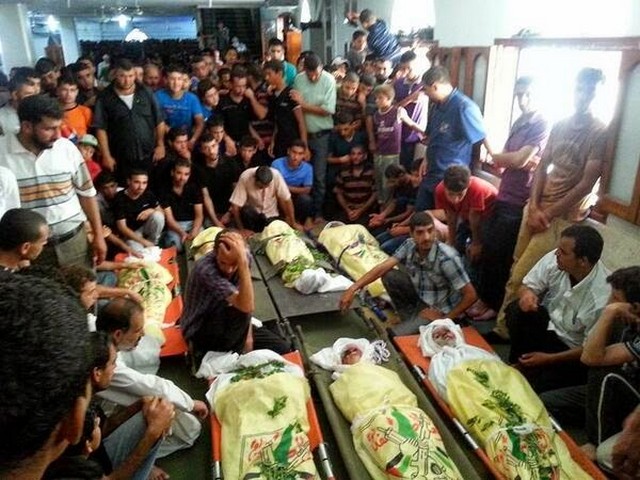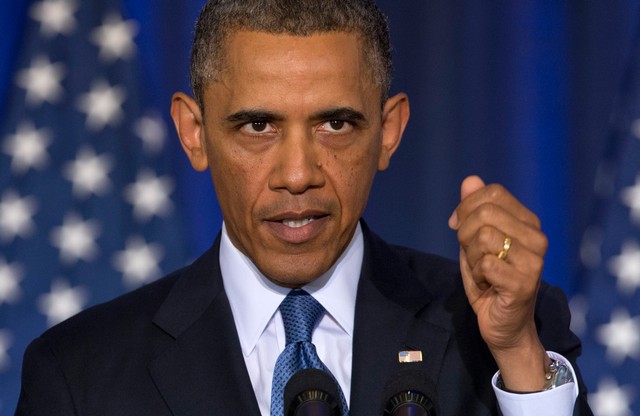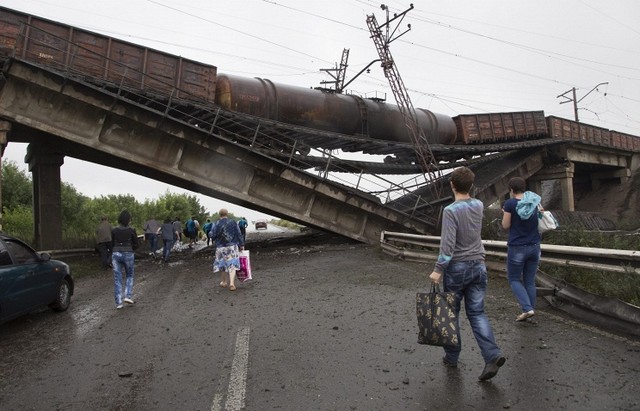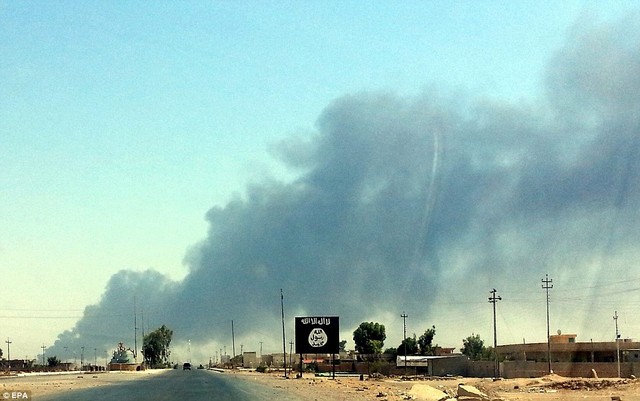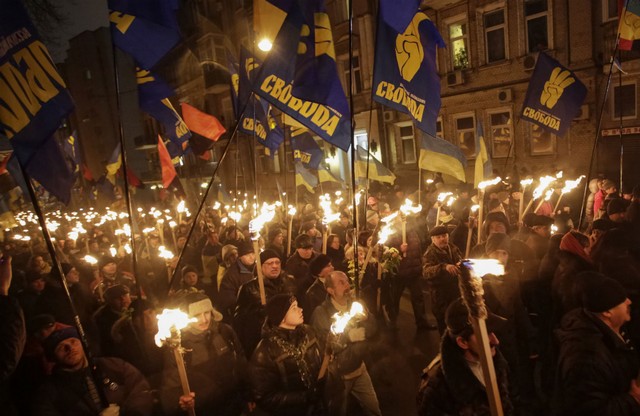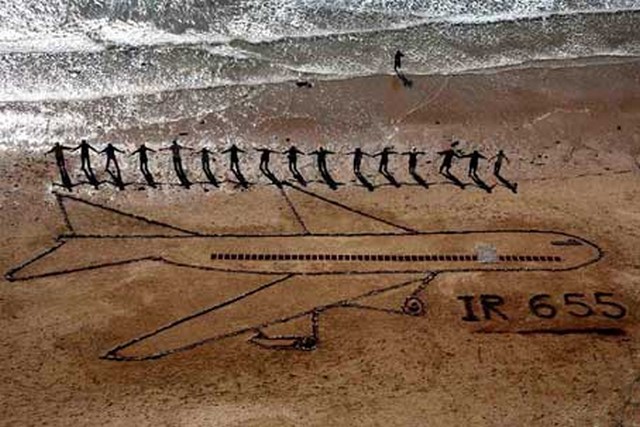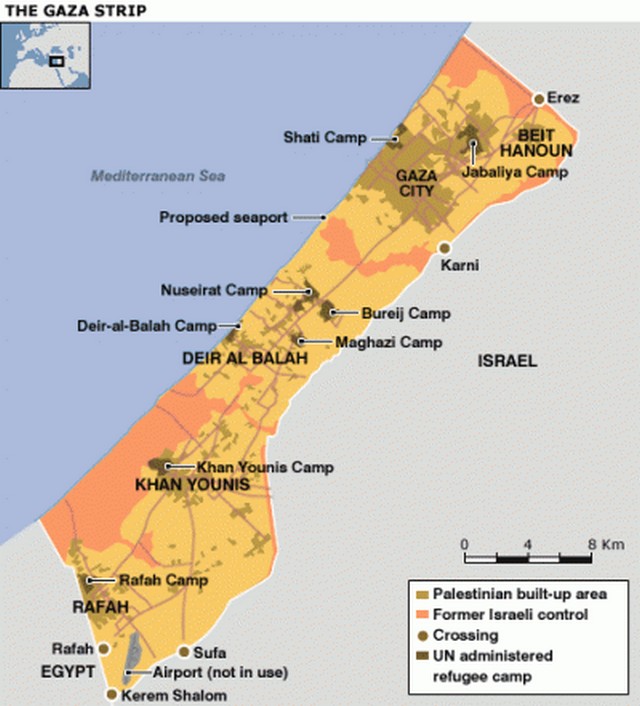The regime has repeatedly carried out artillery and air attacks on city centers, creating a humanitarian catastrophe—which is all but ignored by the US political-media establishment.
By Stephen F. Cohen
Editor’s note: This article was updated on July 7.
For weeks, the US-backed regime in Kiev has been committing atrocities against its own citizens in southeastern Ukraine, regions heavily populated by Russian-speaking Ukrainians and ethnic Russians. While victimizing a growing number of innocent people, including children, and degrading America’s reputation, these military assaults on cities, captured on video, are generating pressure in Russia on President Vladimir Putin to “save our compatriots.” Both the atrocities and the pressure on Putin have increased even more since July 1, when Kiev, after a brief cease-fire, intensified its artillery and air attacks on eastern cities defenseless against such weapons.
The reaction of the Obama administration—as well as the new cold-war hawks in Congress and in the establishment media—has been twofold: silence interrupted only by occasional statements excusing and thus encouraging more atrocities by Kiev. Very few Americans (notably, the independent scholar Gordon Hahn) have protested this shameful complicity. We may honorably disagree about the causes and resolution of the Ukrainian crisis, the worst US-Russian confrontation in decades, but not about deeds that are rising to the level of war crimes, if they have not already done so.
* * *
In mid-April, the new Kiev government, predominantly western Ukrainian in composition and outlook, declared an “anti-terrorist operation” against a growing political rebellion in the Southeast. At that time, the rebels were mostly mimicking the initial Maidan protests in Kiev in 2013—demonstrating, issuing defiant proclamations, occupying public buildings and erecting defensive barricades—before Maidan turned ragingly violent and, in February, overthrew Ukraine’s corrupt but legitimately elected president, Viktor Yanukovych. (The entire Maidan episode, it will be recalled, had Washington’s enthusiastic political, and perhaps more tangible, support.) Indeed, the precedent for seizing official buildings and demanding the allegiance of local authorities had been set even earlier, in January, in western Ukraine—by pro-Maidan, anti-Yanukovych protesters, some declaring “independence” from his government. Reports suggest that even now some cities in central and western Ukraine, regious almost entirely ignored by international media, are controlled by extreme nationalists, not Kiev.
Considering those preceding events, but above all the country’s profound historical divisions, particularly between its western and eastern regions—ethnic, linguistic, religious, cultural, economic and political—the rebellion in the southeast, centered in the industrial Donbass, was not surprising. Nor were its protests against the unconstitutional way (in effect, a coup) the new government had come to power, the southeast’s sudden loss of effective political representation in the capital and the real prospect of official discrimination. But by declaring an “anti-terrorist operation” against the new protesters, Kiev signaled its intention to “destroy” them, not negotiate with them.
On May 2, in this incendiary atmosphere, a horrific event occurred in the southern city of Odessa, awakening memories of Nazi German extermination squads in Ukraine and other Soviet republics during World War II. An organized pro-Kiev mob chased protesters into a building, set it on fire and tried to block the exits. Some forty people, perhaps many more, perished in the flames or were murdered as they fled the inferno. A still unknown number of other victims were seriously injured.
Members of the infamous Right Sector, a far-right paramilitary organization ideologically aligned with the ultranationalist Svoboda party, itself a constituent part of Kiev’s coalition government, led the mob. Both are frequently characterized by knowledgeable observers as “neo-fascist” movements. (Hateful ethnic chants by the mob were audible, and swastika-like symbols were found on the scorched building.) Kiev alleged that the victims had themselves accidentally started the fire, but eyewitnesses, television footage and social media videos told the true story, as they have about subsequent atrocities.
Instead of interpreting the Odessa massacre as an imperative for restraint, Kiev intensified its “anti-terrorist operation.” Since May, the regime has sent a growing number of armored personnel carriers, tanks, artillery, helicopter gunships and warplanes to southeastern cities, among them, Slovyansk (Slavyansk in Russian), Mariupol, Krasnoarmeisk, Kramatorsk, Donetsk and Luhansk (Lugansk in Russian). When its regular military units and local police forces turned out to be less than effective, willing or loyal, Kiev hastily mobilized Right Sector and other radical nationalist militias responsible for much of the violence at Maidan into a National Guard to accompany regular detachments—partly to reinforce them, partly, it seems, to enforce Kiev’s commands. Zealous, barely trained and drawn mostly from central and western regions, Kiev’s new recruits have reportedly escalated the ethnic warfare and killing of innocent civilians. (Episodes described as “massacres” soon also occurred in Mariupol and Kramatorsk.)
Initially, the “anti-terrorist” campaign was limited primarily, though not only, to rebel checkpoints on the outskirts of cities. Since May, however, Kiev has repeatedly carried out artillery and air attacks on city centers that have struck residential buildings, shopping malls, parks, schools, kindergartens and hospitals, particularly in Slovyansk and Luhansk. More and more urban areas, neighboring towns and even villages now look and sound like war zones, with telltale rubble, destroyed and pockmarked buildings, mangled vehicles, the dead and wounded in streets, wailing mourners and crying children. Conflicting information from Kiev, local resistance leaders and Moscow make it impossible to estimate the number of dead and wounded noncombatants—certainly hundreds. The number continues to grow due also to Kiev’s blockade of cities where essential medicines, food, water, fuel and electricity are scarce, and where wages and pensions are often no longer being paid. The result is an emerging humanitarian catastrophe.
Another effect is clear. Kiev’s “anti-terrorist” tactics have created a reign of terror in the targeted cities. Panicked by shells and mortars exploding on the ground, menacing helicopters and planes flying above and fear of what may come next, families are seeking sanctuary in basements and other darkened shelters. Even The New York Times, which like the mainstream American media generally has deleted the atrocities from its coverage, described survivors in Slovyansk “as if living in the Middle Ages.” Meanwhile, an ever-growing number of refugees, disproportionately women and traumatized children, have been fleeing across the border into Russia. In late June, the UN estimated that as many as 110,000 Ukrainians had already fled to Russia, where authorities say the actual numbers are much larger, and about half that many to other Ukrainian sanctuaries.
It is true, of course, that anti-Kiev rebels in these regions are increasingly well-armed (though lacking the government’s arsenal of heavy and airborne weapons), organized and aggressive, no doubt with some Russian assistance, whether officially sanctioned or not. But calling themselves “self-defense” fighters is not wrong. They did not begin the combat; their land is being invaded and assaulted by a government whose political legitimacy is arguably no greater than their own, two of their large regions having voted overwhelmingly for autonomy referenda; and, unlike actual terrorists, they have not committed acts of war outside their own communities. The French adage suggested by an American observer seems applicable: “This animal is very dangerous. If attacked, it defends itself.”
* * *
Among the crucial questions rarely discussed in the US political-media establishment: What is the role of the “neo-fascist” factor in Kiev’s “anti-terrorist” ideology and military operations? Putin’s position, at least until recently—that the entire Ukrainian government is a “neo-fascist junta”—is incorrect. Many members of the ruling coalition and its parliamentary majority are aspiring European-style democrats or moderate nationalists. This may also be true of Ukraine’s newly elected president, the oligarch Petro Poroshenko, though his increasingly extreme words and deeds since being inaugurated on June 7—he has called resisters in the bombarded cities “gangs of animals”—collide with his conciliatory image drafted by Washington and Brussels. Equally untrue, however, are claims by Kiev’s American apologists, including even some academics and liberal intellectuals, that Ukraine’s neo-fascists—or perhaps quasi-fascists—are merely agitated nationalists, “garden-variety Euro-populists,” a “distraction” or lack enough popular support to be significant.
Independent Western scholars have documented the fascist origins, contemporary ideology and declarative symbols of Svoboda and its fellow-traveling Right Sector. Both movements glorify Ukraine’s murderous Nazi collaborators in World War II as inspirational ancestors. Both, to quote Svoboda’s leader Oleh Tyahnybok, call for an ethnically pure nation purged of the “Moscow-Jewish mafia” and “other scum,” including homosexuals, feminists and political leftists. And both hailed the Odessa massacre. According to the website of Right Sector leader Dmytro Yarosh, it was “another bright day in our national history.” A Svoboda parliamentary deputy added, “Bravo, Odessa…. Let the Devils burn in hell.” If more evidence is needed, in December 2012, the European Parliament decried Svoboda’s “racist, anti-Semitic and xenophobic views [that] go against the EU’s fundamental values and principles.” In 2013, the World Jewish Congress denounced Svoboda as “neo-Nazi.” Still worse, observers agree that Right Sector is even more extremist.
Nor do electoral results tell the story. Tyahnybok and Yarosh together received less than 2 percent of the June presidential vote, but historians know that in traumatic times, when, to recall Yeats, “the center cannot hold,” small, determined movements can seize the moment, as did Lenin’s Bolsheviks and Hitler’s Nazis. Indeed, Svoboda and Right Sector already command power and influence far exceeding their popular vote. “Moderates” in the US-backed Kiev government, obliged to both movements for their violence-driven ascent to power, and perhaps for their personal safety, rewarded Svoboda and Right Sector with some five to eight (depending on shifting affiliations) top ministry positions, including ones overseeing national security, military, prosecutorial and educational affairs. Still more, according to the research of Pietro Shakarian, a remarkable young graduate student at the University of Michigan, Svoboda was given five governorships, covering about 20 percent of the country. And this does not take into account the role of Right Sector in the “anti-terrorist operation.”
Nor does it consider the political mainstreaming of fascism’s dehumanizing ethos. In December 2012, a Svoboda parliamentary leader anathematized the Ukrainian-born American actress Mila Kunis as “a dirty kike.” Since 2013, pro-Kiev mobs and militias have routinely denigrated ethnic Russians as insects (“Colorado beetles,” whose colors resemble a sacred Russia ornament). On May 9, at the annual commemoration of the Soviet victory over Nazi Germany, the governor of one region praised Hitler for his “slogan of liberating the people” in occupied Ukraine. More recently, the US-picked prime minister, Arseniy Yatsenyuk, referred to resisters in the Southeast as “subhumans.” His defense minister proposed putting them in “filtration camps,” pending deportation, and raising fears of ethnic cleansing. Yulia Tymoshenko—a former prime minister, titular head of Yatsenyuk’s party and runner-up in the May presidential election—was overheard wishing she could “exterminate them all [Ukrainian Russians] with atomic weapons.” “Sterilization” is among the less apocalyptic official musings on the pursuit of a purified Ukraine.
Confronted with such facts, Kiev’s American apologists have conjured up another rationalization. Any neo-fascists in Ukraine, they assure us, are far less dangerous than Putinism’s “clear aspects of fascism.” The allegation is unworthy of serious analysis: however authoritarian Putin may be, there is nothing authentically fascist in his rulership, policies, state ideology or personal conduct.
Indeed, equating Putin with Hitler, as eminent Americans from Hillary Clinton and Zbigniew Brzezinski to George Will have done, is another example of how our new cold warriors are recklessly damaging US national security in vital areas where Putin’s cooperation is essential. Looking ahead, would-be presidents who make such remarks can hardly expect to be greeted by an open-minded Putin, whose brother died and father was wounded in the Soviet-Nazi war. Moreover, tens of millions of today’s Russians whose family members were killed by actual fascists in that war will regard this defamation of their popular president as sacrilege, as they do the atrocities committed by Kiev.
* * *
And yet, the Obama administration reacts with silence, and worse. Historians will decide what the US government and the “democracy promotion” organizations it funds were doing in Ukraine during the preceding twenty years, but much of Washington’s role in the current crisis has been clear and direct. As the Maidan mass protest against President Yanukovych developed last November-December, Senator John McCain, the high-level State Department policymaker Victoria Nuland and a crew of other US politicians and officials arrived to stand with its leaders, Svoboda’s Tyahnybok in the forefront, and declare, “America is with you!” Nuland was then caught on tape plotting with the American ambassador, Geoffrey Pyatt, to oust Yanukovych’s government and replace him with Yatsenyuk, who soon became, and remains, prime minister.
Meanwhile, President Obama personally warned Yanukovych “not to resort to violence,” as did, repeatedly, Secretary of State John Kerry. But when violent street riots deposed Yanukovych—only hours after a European-brokered, White House–backed compromise that would have left him as president of a reconciliation government until new elections this December, possibly averting the subsequent bloodshed—the administration made a fateful decision. It eagerly embraced the outcome. Obama personally legitimized the coup as a “constitutional process” and invited Yatsenyuk to the White House. The United States has been at least tacitly complicit in what followed, from Putin’s hesitant decision in March to annex Crimea and the rebellion in southeastern Ukraine to the ongoing civil war and Kiev’s innocent victims.
How intimately involved US officials have been in Kiev’s “anti-terrorist operation” is not known, but certainly the administration has not been discreet. Before and after the military campaign began in earnest, CIA director John Brennan and Vice President Joseph Biden (twice) visited Kiev, followed, it is reported, by a continuing flow of “senior US defense officials,” military equipment and financial assistance to the bankrupt Kiev government. Despite this crucial support, the White House has not compelled Kiev to investigate either the Odessa massacre or the fateful sniper killings of scores of Maidan protesters and policemen on February 18–20, which precipitated Yanukovych’s ouster. (The snipers were initially said to be Yanukovych’s, but evidence later appeared pointing to opposition extremists, possibly Right Sector. Unlike Washington, the Council of Europe has been pressuring Kiev to investigate both events.)
As atrocities and humanitarian disaster grow in Ukraine, both Obama and Kerry have all but vanished as statesmen. Except for periodic banalities asserting the virtuous intentions of Washington and Kiev and alleging Putin’s responsibility for the violence, they have left specific responses to lesser US officials. Not surprisingly, all have told the same Manichean story, from the White House to Foggy Bottom. The State Department’s neocon missionary Nuland, who spent several days at Maidan, for example, assured a congressional committee that she had no evidence of fascist-like elements playing any role there. Ambassador Pyatt, who earlier voiced the same opinion about the Odessa massacre, was even more dismissive, telling obliging New Republic editors that the entire question was “laughable.”
Still more shameful, no American official at any level appears to have issued a meaningful statement of sympathy for civilian victims of the Kiev government, not even those in Odessa. Instead, the administration has been unswervingly indifferent. When asked if her superiors had “any concerns” about the casualties of Kiev’s military campaign, State Department spokeswoman Jen Psaki has repeatedly answered “no.” Even worse, the German, French and Russian foreign ministers having urged Poroshenko to extend the ceasefire, his decision instead to intensify Kiev’s military campaign was clearly taken with the encouragement or support of the Obama administration.
Indeed, at the UN Security Council on May 2, US Ambassador Samantha Power, referring explicitly to the “counterterrorism initiative” and suspending her revered “Responsibility to Protect” doctrine, gave Kiev’s leaders a US license to kill. Lauding their “remarkable, almost unimaginable, restraint,” as Obama himself did after Odessa, she continued, “Their response is reasonable, it is proportional, and frankly it is what any one of our countries would have done.” (Since then, the administration has blocked Moscow’s appeal for a UN humanitarian corridor between southeastern Ukraine and Russia.)
Contrary to the incessant administration and media demonizing of Putin and his “agents” in Ukraine, the “anti-terrorist operation” can be ended only where it began—in Washington and Kiev. Leaving aside how much power the new president actually has in Kiev (or over Right Sector militias in the field), Poroshenko’s “peace plan” and June 21 cease-fire may have seemed such an opportunity, except for its two core conditions: fighters in the southeast first had to “lay down their arms,” and he alone would decide with whom to negotiate peace. The terms seemed more akin to conditions of surrender, and the real reason Poroshenko unilaterally ended the cease-fire on July 1 and intensified Kiev’s assault on eastern cities, especially on the smaller towns of Slovyansk and Kramatorsk, which their defenders abandoned—to prevent more civilian casualities, they said—on July 5–6.
The Obama administration continues to make the situation worse. Despite opposition by several NATO allies and even American corporate heads, the president and his secretary of state, who has spoken throughout this crisis more like a secretary of war than the nation’s top diplomat, have constantly threatened Russia with harsher economic sanctions unless Putin meets one condition or another, most of them improbable. On June 26, Kerry even demanded (“literally”) that the Russian president “in the next few hours…help disarm” resisters in the Southeast, as though they are not motivated by any of Ukraine’s indigenous conflicts but are merely Putin’s private militias.
Please support our journalism. Get a digital subscription for just $9.50!
In fact, from the onset of the crisis, the administration’s actual goal has been unclear, and not only to Moscow. Is it a negotiated compromise, which would have to include a Ukraine with a significantly federalized or decentralized state free to maintain longstanding economic relations with Russia and banned from NATO membership? Is it to bring the entire country exclusively into the West, including into NATO? Is it a vendetta against Putin for all the things he purportedly has and has not done over the years? (Some behavior of Obama and Kerry, seemingly intended to demean and humiliate Putin, suggest an element of this.) Or is it to provoke Russia into a war with the United States and NATO in Ukraine?
Inadvertent or not, the latter outcome remains all too possible. After Russia annexed—or “reunified” with—Crimea in March, Putin, not Kiev or Washington, has demonstrated “remarkable restraint.” But events are making it increasingly difficult for him to do so. Almost daily, Russian state media, particularly television, have featured vivid accounts of Kiev’s military assaults on Ukraine’s eastern cities. The result has been, both in elite and public opinion, widespread indignation and mounting perplexity, even anger, over Putin’s failure to intervene militarily.
We may discount the following indictment by an influential ideologist of Russia’s own ultra-nationalists, who have close ties with Ukraine’s “self-defense” commanders: “Putin betrays not just the People’s Republic of Donetsk and the People’s Republic of Lugansk but himself, Russia and all of us.” Do not, however, underestimate the significance of an article in the mainstream pro-Kremlin newspaper Izvestia, which asks, while charging the leadership with “ignoring the cries for help,” “Is Russia abandoning the Donbass?” If so, the author warns, the result will be “Russia’s worst nightmare” and relegate it to “the position of a vanquished country.”
Just as significant are similar exhortations by Gennady Zyuganov, leader of Russia’s Communist Party, the second-largest in the country and in parliament. The party also has substantial influence in the military-security elite and even in the Kremlin. Thus, one of Putin’s own aides has publicly urged him to send fighter planes to impose a “no-fly zone”—an American-led UN action in Qaddafi’s Libya that has not been forgotten or forgiven by the Kremlin—and destroy Kiev’s approaching aircraft and land forces. If that happens, US and NATO forces, now being built up in Eastern Europe, might well also intervene, creating a Cuban missile crisis–like confrontation. As a former Russian foreign minister admired in the West reminds us, there are “hawks on both sides.”
In recent days, Kiev’s stepped-up “punitive” campaign against eastern Ukrainian citizens, shelling of Russia’s own bordering territory and the subjugation of Slovyansk and Kramatorsk have made anger over Putin’s inaction even more vocal in his own establishment. On July 4, the dean of Moscow State University’s School of Television, a semi-official position, even suggested that the Kremlin was part of “a strange conspiracy of silence” with Western governments to conceal the number of Kiev’s innocent victims. He warned that “those who permit murderers to win…automatically have the blood of peaceful citizens on their hands.” And on July 6, the state’s leading television news network demanded that the Kremlin take immediate military action, including imposing a “no-fly zone.”
Little of this is even noted in the United States. In a democratic political system, the establishment media are expected to pierce the official fog of war. In the Ukrainian crisis, however, mainstream American newspapers and television have been almost as slanted and elliptical as White House and State Department statements, obscuring the atrocities, if reporting them at all, and generally relying on information from Washington and Kiev. Why, for example, are not the The New York Times, The Washington Post and major television networks reporting directly from Ukraine’s war-ravaged cities, only from Moscow and Kiev, or at least doing reports based on other foreign media? Most Americans are thereby unknowingly being shamed by the Obama administration’s role. Those who do know but remain silent—in government, think tanks, universities and media—share its complicity.
Stephen F. Cohen is a professor emeritus at New York University and Princeton University.
30 June 2014
http://www.thenation.com/

